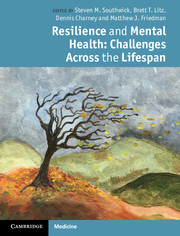Book contents
- Frontmatter
- Contents
- Contributors
- Preface
- Section 1 Pathways to resilience
- Neurobiology of resilience
- 2 Resilience in the face of stress: emotion regulation as a protective factor
- 3 Cognitive factors and resilience: how self-efficacy contributes to coping with adversities
- 4 Personality factors in resilience to traumatic stress
- 5 Social ties and resilience in chronic disease
- 6 Religious and spiritual factors in resilience
- Section 2 Resilience across the lifespan
- Section 3 Resilience in families, communities, and societies
- Section 4 Specific challenges
- Section 5 Training for resilience
- Index
- References
5 - Social ties and resilience in chronic disease
from Section 1 - Pathways to resilience
Published online by Cambridge University Press: 07 September 2011
- Frontmatter
- Contents
- Contributors
- Preface
- Section 1 Pathways to resilience
- Neurobiology of resilience
- 2 Resilience in the face of stress: emotion regulation as a protective factor
- 3 Cognitive factors and resilience: how self-efficacy contributes to coping with adversities
- 4 Personality factors in resilience to traumatic stress
- 5 Social ties and resilience in chronic disease
- 6 Religious and spiritual factors in resilience
- Section 2 Resilience across the lifespan
- Section 3 Resilience in families, communities, and societies
- Section 4 Specific challenges
- Section 5 Training for resilience
- Index
- References
Summary
Introduction
Social ties are thought to affect mental and physical health by influencing emotions, cognitions, and behavior (Cohen, 1988, 2004). In the case of mental health, the hypothesis is that aspects of social relationships regulate these three response systems by preventing the occurrence of the kinds of extreme response that are associated with dysfunction. This regulation occurs through communication of social expectations, of appropriate norms, of rewards and punishments, and through the provision of coping assistance (Caplan, 1974; Cassel, 1976; Thoits, 1986). In the case of physical health, the hypothesis is that social ties influence behaviors with implications for health such as diet, exercise, smoking, alcohol consumption, sleep, and adherence to medical regimens. Moreover, the failure to regulate emotional responses can trigger health-relevant changes in the responses of the neuroendocrine, immune, and cardiovascular systems (Cohen, 1988; Cohen et al., 1994; Uchino, 2006).
During times of stress, social ties can be thought to operate by these same mechanisms to promote resilience, or positive adaptation in the face of adversity (Cohen & Wills, 1985; Luthar, 2006). People undergoing the stress of being diagnosed with a serious chronic illness are vulnerable to both physical and psychological adversity. Patients with chronic disease must cope with the physical threats of worsening health, loss of physical function, and the potential of a reduced lifespan, as well as with psychological threats such as feelings of isolation, loss of self-esteem, and loss of social and occupational role function.
- Type
- Chapter
- Information
- Resilience and Mental HealthChallenges Across the Lifespan, pp. 76 - 89Publisher: Cambridge University PressPrint publication year: 2011
References
- 9
- Cited by

